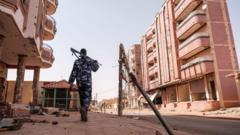A flight from Damascus to Aleppo marks the beginning of a new chapter in the war-torn nation's history
Hopes Rise as Domestic Flights Resume in Post-Assad Syria

Hopes Rise as Domestic Flights Resume in Post-Assad Syria
NewRevolutionary changes signal a hopeful future for Syria's aviation industry
Shortly before the first domestic flight from Damascus touched down at Aleppo International Airport, preparations for the historic arrival were in full swing. Workers hurriedly cleared away empty ammunition boxes, helmets, and gas masks from the runway vicinity, signaling a new era for the war-torn nation.
When the Syrian Air flight finally landed—taking off more than an hour late—its arrival was met with cheers from journalists and a contingent of military police and civil defense workers who were on standby. Despite the tense atmosphere that once filled the airport during the decade-long civil conflict, the rebels who deposed Assad only days prior view this event as a demonstration of their ability to govern the nation effectively.
“This arrival is a significant milestone for us; it's indicative of our commitment to rebuilding our country,” said Anas Rustum, the newly appointed overseer of the Aleppo airport by the rebel group Hayat Tahrir al-Sham. With aspirations to potentially welcome international airlines, Rustum emphasized the importance of these tangible developments in instilling confidence among the war-weary populace.
The example of today's flight serves not only as a symbol of the new government's management capabilities but also as an assertion of security in a region once plagued by violence. Onlookers included a security officer stationed on the roof of the terminal, overseeing the event from above.
The airport itself is a stark representation of the transformation happening within Syria. In prior years, the site had been a strategic military hub for the Assad regime, frequently utilized to launch attacks on opposition-held territories. Ahmed Ibrahim, an airport control tower operator with nearly 30 years of experience, recounted a time when regime forces had set up weaponry to target civilians in the surrounding neighborhoods.
With the recent rebel victory, the employee morale at Aleppo International Airport has shifted from fear to optimism, as they are now invited back to their posts by the new rebel leadership. “We’re hopeful that this would open doors to foreign nations,” Ibrahim added, underscoring the importance of aviation in facilitating international relations in a reformed Syria.
When the Syrian Air flight finally landed—taking off more than an hour late—its arrival was met with cheers from journalists and a contingent of military police and civil defense workers who were on standby. Despite the tense atmosphere that once filled the airport during the decade-long civil conflict, the rebels who deposed Assad only days prior view this event as a demonstration of their ability to govern the nation effectively.
“This arrival is a significant milestone for us; it's indicative of our commitment to rebuilding our country,” said Anas Rustum, the newly appointed overseer of the Aleppo airport by the rebel group Hayat Tahrir al-Sham. With aspirations to potentially welcome international airlines, Rustum emphasized the importance of these tangible developments in instilling confidence among the war-weary populace.
The example of today's flight serves not only as a symbol of the new government's management capabilities but also as an assertion of security in a region once plagued by violence. Onlookers included a security officer stationed on the roof of the terminal, overseeing the event from above.
The airport itself is a stark representation of the transformation happening within Syria. In prior years, the site had been a strategic military hub for the Assad regime, frequently utilized to launch attacks on opposition-held territories. Ahmed Ibrahim, an airport control tower operator with nearly 30 years of experience, recounted a time when regime forces had set up weaponry to target civilians in the surrounding neighborhoods.
With the recent rebel victory, the employee morale at Aleppo International Airport has shifted from fear to optimism, as they are now invited back to their posts by the new rebel leadership. “We’re hopeful that this would open doors to foreign nations,” Ibrahim added, underscoring the importance of aviation in facilitating international relations in a reformed Syria.



















